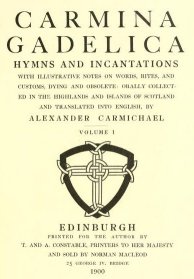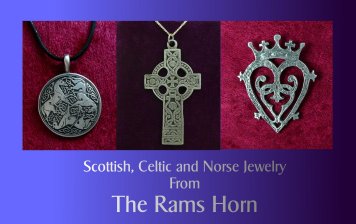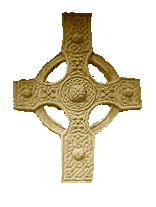
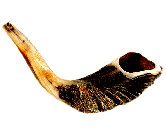
HOME | home
Beltane Blessing
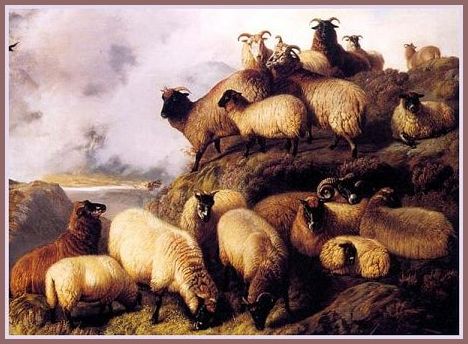
Oh God, bless our flocks and bearing kine;
Hate nor scath let not come near us,
Drive from us the ways of the wicked.
Keep thine eye every Monday and Tuesday
On the bearing kine and the pairing queys;
Accompany us from hill to sea,
Gather thyself the sheep and their progeny.
Every Wednesday and Thursday be with them,
Be thy gracious hand always about them;
Tend the cows down to their stalls,
Tend the sheep down to their folds!
Every Friday be thou, O Saint, at their head,
Lead the sheep from the face of the bens,
With their innocent little lambs following them,
Encompass them with God's encompassing.
Every Saturday be likewise with them,
Bring the goats in with their young,
Every kid and goat to the sea side,
And from the Rock of Aegir on high,
With cresses green about its summit.
The strength of the Triune be our shield in distress,
The strength of Christ, His peace and His Pasch,
The strength of the Spirit, Physician of health,
And of every other saint who succeeded them
And who earned the repose of the kingdom of God.
Bless ourselves and our children,
Bless every one who shall come from our loins,
Bless him whose name we bear,
Bless, O God, her from whose womb we came.
Every holiness, blessing and power,
Be yielded to us every time and every hour,
In name of the Holy Threefold above,
Father, Son, and Spirit everlasting.
Be the Cross of Christ to shield us downward,
Be the Cross of Christ to shield us upward,
Be the Cross of Christ to shield us roundward,
Accepting our Beltane blessing from us,
Accepting our Beltane blessing from us.
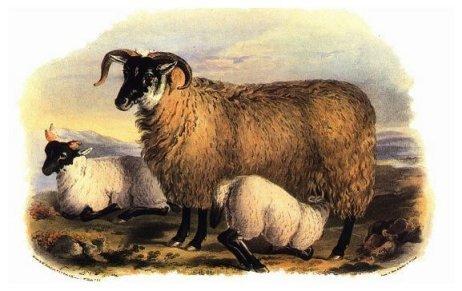
AM BEANNACHD BEALLTAIN
Beannaich an t-al's an crodh-laoigh;
Na leig fuath no foirne, 'n ar gaoith,
Fuadaich oirnne doigh nan daoi.
Cum do shuil gach Luan is Mart,
Air crodh-laoigh's air aighean dair;
Iomachair leinn o bheinn gu sal,
Tionail fein an treud 's an t-al.
Gach Ciadaon agus Daorn bi leo,
Biodh do lamh chaon a chaoidh 'n an coir;
Cuallaich buar d'am buabhal bho,
Cuallaich cuanal d'an cual chro.
Gach Aona bi-sa, a Naoimh, 'n an ceann,
Treoraich caoraich a aodann bheann,
Le 'n al beag ba as an deigh,
Cuartaich 'ad le cuartachd Dhe.
Gach Sathurna bith leo mar chach,
Tabhair gobhair a steach le 'n al,
Gach meann is maos gu taobh sal,
Is Lioc a h-Eigir gu h-ard,
Le biolair uaine shuas m'a barr.
Treoir na Trianailt d' ar dian's gach cas,
Treoir Chriosda le shith's le Phais,
Treoir an Spioraid, Ligh na slaint,
Is Athar priseil, Righ nan gras.
'S gach naomh eile bha nan deigh
'S a choisinn suamhnas rioghachd De.
Beannaich sinn fein agus ar cloinn,
Beannaich gach creubh a thig o'r loinn,
Beannaich am fear sin air an sloinn,
Beannaich a Dhe, an te a rug o'n bhroinn.
Gach naomhachd, beannachd agus buaidh,
Bhi 'g aomadh leinn gach am 's gach uair,
An ainm Trithinn Naomha shuas,
Athar, Mic, is Spiorad buan.
Crois Chriosd bhi d' ar dion a nuas,
Crois Chriosd bhi d' ar dion a suas,
Crios Chriosd bhi d' ar dion mu 'r cuart,
Gabhail beannachd Bealltain uainn,
Gabhail beannachd Bealltain uainn.
Like Candlemas, Lammas and Halloween, May Day is one of the corner days which fall between the solar
festivals of the year (the equinoxes and solstices). The ancient Celts called this holiday Beltane and began
celebrating at sunset on April 30th. It marked the beginning of summer, time to move with the flocks up to the
summer pastures.
Alexander Carmichael, a 19th century amateur folklorist,
describes the annual procession to the summer pastures:
On the first day of May the people of the crofter townland are
up betimes and busy as bees
about to swarm. This is the day of migrating, bho baile gu beinn (from townland to moorland),
from the winter homestead to the summer sheiling. The summer of their joy is come, the
summer of the sheiling, the song, the pipe and the dance, when the people ascend the hill to
the clustered bothies, overlooking the distant sea from among the fronded ferns and fragrant
heather, where neighbour meets neighbour, and lover meets lover.
The animals were driven in procession with the sheep leading,
the cattle following, according to their ages, with the
goats next and the horses last. The men carried the tools needed to repair the summer huts while the women
brought the bedding, food supplies and cooking utensils. They hiked up their skirts to enable them to walk with
greater ease. Once they reached the summer grazing ground and finished their errands, they feasted on an
unblemished male lamb killed that day. Then the prayed. The Protestants called on the Holy Trinity but the
Catholics also invoked St Michael of the three-cornered shield and flaming sword; St Columba, guardian of the
cattle; Bride, the foster-mother of Christ; and the Virgin, mother of the White Lamb.
As the people intone their prayers on the lonely hillside,
literally in the wilderness, the music of
their evensong floats over glen and dell, loch and stream, and is echoed from corrie and cliff
till it is lost on the soft evening air.
Collected in the Highlands of Scotland and
Translated by Alexander Carmichael from the Gaelic
We hope you enjoyed this and go to the site whereyou can sample many of these ancient prayers and incantations. Very special thanks to A' Chiste Ghaidhlig for this material. Peace and Joy to you and yours
- Beth Maxwell Boyle
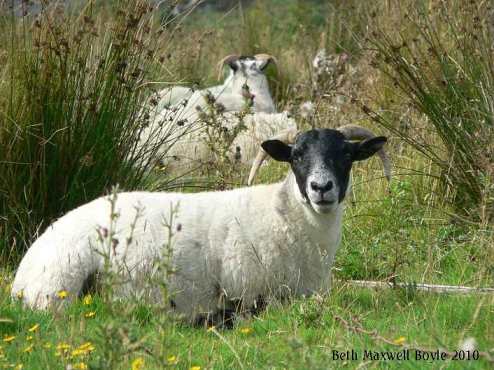
"A righteous man has regard for the life of his beast."
-Proverbs 12:10

'Feuch air fear coimhead Israil
Cadal chan aom no suain.'
(The Shepherd that keeps Israel
He slumbers not nor sleeps.)

